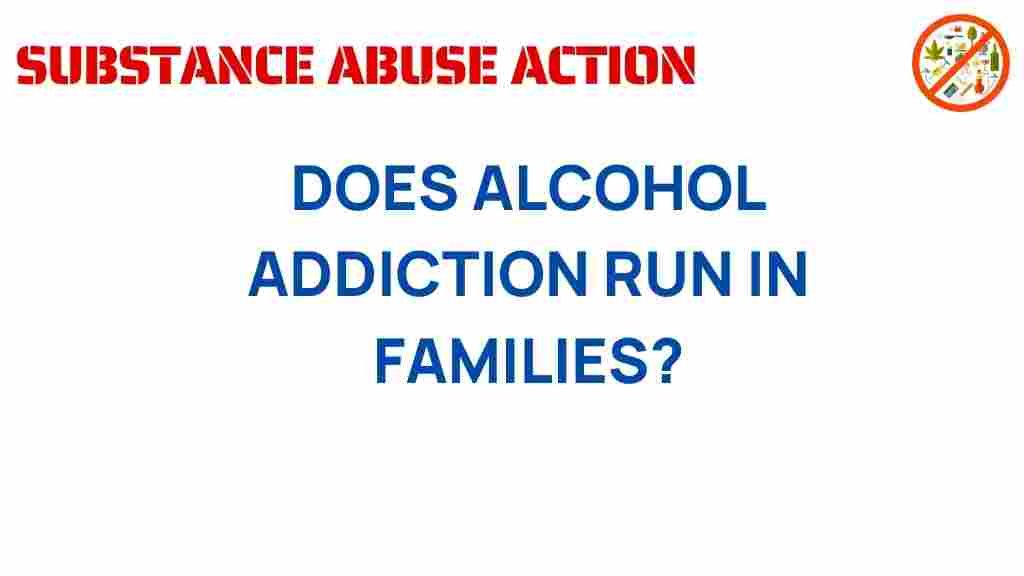Unraveling the Family Connection: Does Alcohol Addiction Run in Families?
Alcohol addiction is a complex and multifaceted issue that affects millions of individuals and their families worldwide. Understanding the role of family history in the development of alcohol addiction can provide insights into prevention and treatment strategies. In this article, we will explore the connection between alcohol addiction, family dynamics, and the genetic and environmental risk factors that contribute to this condition.
The Genetic Link to Alcohol Addiction
Research indicates that genetics plays a significant role in determining an individual’s susceptibility to alcohol addiction. Studies suggest that individuals with a family history of alcohol use disorder (AUD) are more likely to develop similar patterns of behavior. Here are some key points regarding the hereditary aspects of alcohol addiction:
- Family History: Individuals with a parent or sibling who struggles with alcohol addiction face a higher risk of developing their own issues with alcohol.
- Genetic Predisposition: Specific genes have been identified that may increase the likelihood of addiction. These genes can affect how the body metabolizes alcohol and how it responds to its effects.
- Shared Environment: Beyond genetics, shared environmental factors, such as family dynamics and cultural attitudes toward drinking, also contribute to the risk of alcohol addiction.
Understanding Risk Factors
In addition to genetic predisposition, several risk factors can influence the likelihood of developing alcohol addiction. These include:
- Age of Onset: Early exposure to alcohol can increase the risk of developing addiction later in life.
- Mental Health Issues: Co-occurring mental health disorders such as depression, anxiety, or ADHD can heighten the risk of alcohol addiction.
- Social Influences: Peer pressure and social circles can significantly impact an individual’s drinking behavior.
- Stressful Life Events: Trauma or significant life changes can lead individuals to use alcohol as a coping mechanism.
Prevention Strategies for Alcohol Addiction
Given the hereditary nature of alcohol addiction, implementing prevention strategies within families can mitigate risks. Here are some effective approaches:
- Education on Alcohol Use: Teaching family members about the risks associated with alcohol can promote informed decision-making.
- Open Communication: Encouraging discussions about alcohol use and its consequences can help family members feel supported and understood.
- Healthy Coping Mechanisms: Promoting alternative coping strategies for stress, such as exercise or creative hobbies, can reduce reliance on alcohol.
- Positive Role Models: Families should strive to model healthy behaviors concerning alcohol consumption.
Treatment Options for Alcohol Addiction
If you or a loved one is struggling with alcohol addiction, it is crucial to seek appropriate treatment. There are various options available, including:
- Detoxification: This initial phase helps individuals safely withdraw from alcohol under medical supervision.
- Rehabilitation Programs: Inpatient or outpatient programs provide structured support and therapy to address the underlying issues of addiction.
- Counseling and Therapy: Individual or group therapy can be invaluable for understanding the roots of addiction and developing healthier coping strategies.
- Support Groups: Organizations like Alcoholics Anonymous (AA) offer community support for individuals in recovery.
Support for Families Affected by Alcohol Addiction
Alcohol addiction does not only affect the individual; it also impacts families. Here are some ways families can support one another:
- Educate Yourself: Understanding alcohol addiction and its effects can help family members provide the right support.
- Encourage Treatment: Support your loved one in finding treatment options that work for them.
- Practice Self-Care: Family members should also take care of their own mental health and seek support if needed.
- Join Support Groups: Family members can benefit from joining groups like Al-Anon, which offers support for those affected by another person’s drinking.
Troubleshooting Tips for Families
When dealing with alcohol addiction within the family, challenges can arise. Here are some troubleshooting tips:
- Recognize Denial: Understand that denial is common in individuals struggling with addiction. Approach conversations with empathy and patience.
- Set Boundaries: Establish clear boundaries to protect your own well-being while supporting your loved one.
- Seek Professional Guidance: Consider family therapy to address underlying issues and improve communication.
- Stay Informed: Continuously educate yourself about alcohol addiction and recovery to better support your family member.
Conclusion
Understanding the connection between alcohol addiction and family history is crucial in addressing this complex issue. Genetics, shared environment, and various risk factors all contribute to the likelihood of developing alcohol addiction. By focusing on prevention, treatment, and support, families can navigate the challenges posed by alcohol addiction together.
For more information on alcohol addiction and its impact on families, consider visiting NIAAA, the National Institute on Alcohol Abuse and Alcoholism. Additionally, if you are looking for support resources, check out this helpful link.
In the journey of recovery, the support and understanding of family members can make a significant difference. Remember, while alcohol addiction may have hereditary aspects, hope and healing are possible through informed action and compassionate support.
This article is in the category Addiction and created by SubstanceAbuseAction Team
